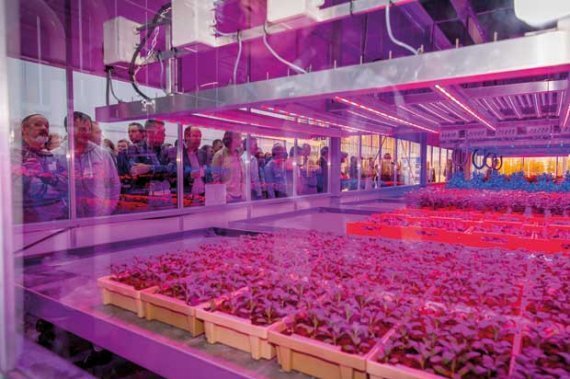<In Bleiswijk, WUR Greenhouse Horticulture does research with LED lighting and other methods; photo: Resource>
WUR Greenhouse Horticulture already collaborates with the supplying companies within the ‘Club of 100’. These companies can set out research at WUR starting from an annual contribution of a mere 15,000 euros. ‘We were constantly asked questions by market gardeners who also wanted to work with us’, says Erik Toussaint, Communications Manager for the Plant Sciences Group. Just as with the Club of 100, the market gardeners put half of the 15,000 euros in joint research with the other members. The other half is used to buy specific knowledge for the given company. WUR hopes to eventually get around 20 large and innovative gardeners to be part of Glastuinbouw Inno20.
Margin
An analysis by consultancy firm McKinsey in 2014 showed that the Dutch greenhouse horticulture does not distinguish itself and produces a lot of basic products with low profit margins. Market gardeners only have a truly profitable year when the competition abroad suffers a bad harvest due to bad weather, for example. This means the sector needs to innovate. That is why the WUR greenhouse horticulture researchers want to work together with innovative farmers on the development of new, high grade crops with a healthy profit margin.
Medicine
Possibilities they consider include the production of medicine from plants grown in glasshouses, natural flavours and fragrances and exotic crops with a constant quality throughout the entire year. This development often starts with the screening of suitable vegetable strains that can effectively produce these compounds. The market gardeners will also search for ways to market these promising crops.
The seven companies that form the basis of Glastuinbouw Inno20 are Dings Aardbeien & Brookberries, Duijvestijn Tomaten, Fresh Group, Kwekerij de Wieringermeer, Opti-flor, Ter Laak Orchids and Van der Voort. For now, the collaboration has been set for two years. Together with the researchers, they will determine which knowledge development on new crops is necessary. WUR hopes that additional glasshouse vegetable farms and floricultural companies will follow up and join the research club.

